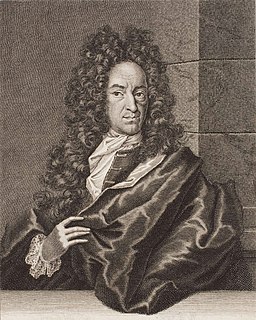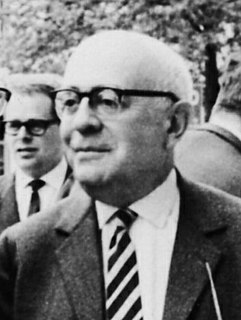A Quote by Thomas Aquinas
God should not be called an individual substance, since the principle of individuation is matter.
Quote Topics
Related Quotes
As a matter of principle, we believe patients should be able to see the right doctor at the right time. As a matter of principle, we believe nothing should interfere with that doctor-patient relationship. As a matter of principle, we believe all Americans deserve affordable, available, and reliable quality health care.
Of the eternal corporeal substance (which is not producible ex nihilo, nor reducible ad nihilum, but rarefiable, condensable, formable, arrangeable, and "fashionable") the composition is dissolved, the complexion is changed, the figure is modified, the being is altered, the fortune is varied, only the elements remaining what they are in substance, that same principle persevering which was always the one material principle, which is the true substance of things, eternal, ingenerable and incorruptible.
Since God is the end of man, since he has created us to be perfect and happy in him, it is manifest that if the designs of creation have not here below been entirely frustrated, there should be found men who tend to their end in seeking and loving God. And nevertheless, because of human liberty, there should also be found other men who neglect God, their principle and their end, and yield to the seduction of created things. Such indeed is the spectacle which the history of the world unceasingly presents to us.
Critics of Consequentialism have often assumed that hedonism (or preference-satisfaction) must be the theory of the good, that the deontic principle must be maximizing, and that the principle should be applied to individual acts. Indeed, this version is often called "classical utilitarianism" and attributed to Bentham and sometimes even to Mill. Rather than a "classical" view it is a recent construction foisted on to the tradition.
Freud made the discovery- quite genuinely, simply through working on his own material- that the more deeply one explores the phenomena of human individuation, the more unreservedly one grasps the individual as a self-contained and dynamic entity, the closer one draws to that in the individual which is really no longer individual.
The electrical matter consists of particles extremely subtile, since it can permeate common matter, even the densest metals, with such ease and freedom as not to receive any perceptible resistance.
If anyone should doubt whether the electrical matter passes through the substance of bodies, or only over along their surfaces, a shock from an electrified large glass jar, taken through his own body, will probably convince him.
Electrical matter differs from common matter in this, that the parts of the latter mutually attract, those of the former mutually repel each other.
Briefly, in the act of composition, as an instrument there intervenes and is most potent, fire, flaming, fervid, hot; but in the very substance of the compound there intervenes, as an ingredient, as it is commonly called, as a material principle and as a constituent of the whole compound the material and principle of fire, not fire itself. This I was the first to call phlogiston.
Now let us regard the idea of God from the magic standpoint, according to the four elements, the so-called tetragrammaton, the unspeakable, the supreme: the fiery principle involves the almightiness and the omnipotence, the airy principle owns the wisdom, purity and clarity, from which aspect proceeds the universal lawfulness. Love and eternal life are attributed to the watery principle, and omnipresence, immortality and consequently eternity belong to the earth principle. These four aspects together represent the supreme Godhead.
Philosophers should consider the fact that the greatest happiness principle can easily be made an excuse for a benevolent dictatorship. We should replace it by a more modest and more realistic principle - the principle that the fight against avoidable misery should be a recognized aim of public policy, while the increase of happiness should be left, in the main, to private initiative.





































